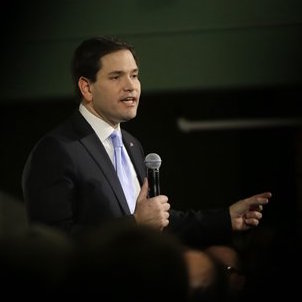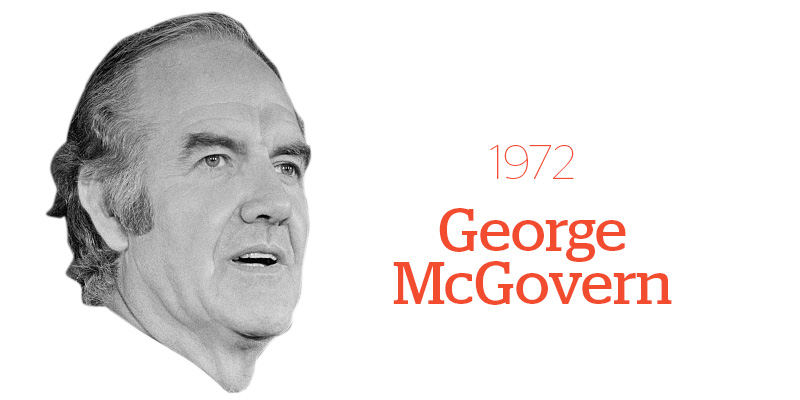Sign up for the daily CJR newsletter.
The Iowa caucuses are a referendum on expectations. Look no further than the media coverage of Donald Trump’s second-place finish on Monday night, which cast the billionaire as a loser despite drawing 4,000 more caucus votes than any GOP candidate before him. The problem? Ted Cruz attracted more—27 percent of caucus goers compared to 24 percent for Trump—shattering the win-first, ask-questions-later persona that has framed Trump’s campaign.
The media hype machine spit out other narratives as well. Among them: Florida Senator Marco Rubio, who came in third, was a big winner. Unlike Trump, Rubio beat expectations. And inherently rosy reports of his newfound Marcomentum—We got the big mo’!—will be following him to New Hampshire on Tuesday.
Politics: Guy who finished 3rd won. Woman who finished 1st lost. One guy who finished 2nd lost; other guy who finished 2nd won #IowaCaucus
— Manuel Roig-Franzia (@RoigFranzia) February 2, 2016
The caucus was undoubtedly good for Rubio’s campaign. But the momentum narrative is flawed analysis at best, vacuous horserace journalism at worst—and especially so in highly volatile primary campaigns. The premise of today’s revelations rely on yesterday’s poor predictions of who is most likely to win. The media often oversimplifies how electoral victories could propel more victories, among voters or party elite. While the reporting entices audiences to stay interested, it also plays into campaigns’ hands by covering the “winners” in a positive trajectory.
in 2008 HRC was 3rd and that was a loss; in 2016 Rubio is 3rd and that is win-all about expectations
— Greta Van Susteren (@greta) February 2, 2016
To paraphrase a Politico story that was just one of many examples Tuesday: Rubio’s headed to New Hampshire with the wind—the media, that is—at his back.
Who sets expectations?
Momentum can’t exist in a vacuum. And news organizations typically rely on polling to provide a general estimation of where candidates stand with voters—to set expectations. Such data seemingly lends an air of credibility to pundits and daily news coverage alike.
The problem, however, is that primary polling is not all that predictive. As of Monday, the Real Clear Politics polling average pegged Rubio’s support at nearly 17 percent in Iowa, a distant third behind Trump and Cruz. Even the final Des Moines Register/Bloomberg Politics poll, a highly respected survey released Saturday, put Rubio’s support at 15 percent. He drew 23 percent when votes were tallied Monday—a “very big night,” as The Washington Post put it.
This is not that hard:
Polls in general elections = pretty good.
Polls in primaries = much less accurate.
Iowa caucus = especially tough.— Nate Silver (@NateSilver538) February 2, 2016
The candidate’s role is to temper expectations, and Rubio’s campaign effectively followed the pattern. Various media across the political spectrum reported or commented on this pre-caucus expectations game. Yet several of them also covered Rubio’s performance in Iowa with a sense of surprise. The conservative National Review framed the night as if such bet-hedging should be left unchallenged: “While Cruz may have won the caucuses, which he needed to do, Rubio did something his campaign considers more important: He defied expectations. Rubio and his team worked deliberately to keep expectations in check in the days leading up to the caucuses.”
What does momentum mean?
Analyzing polls—and comparing them to actual results—is an obvious place to start. But a more useful definition of momentum is also the more difficult topic to report on: money. Rubio’s victory in Iowa may help him consolidate support among the GOP donor class and party elites, making him a more viable general election candidate. But those changes are more subtle and difficult to quantify.
In November, journalists awarded Chris Christie the momentum tag after he picked up endorsements from the Manchester Union-Leader, former New Hampshire House Speaker Donna Sytek, and two business leaders from the state. But it didn’t translate to a stable bump in the polls; after a month or so in double digits, he’s back around 6 percent. Chris Cillizza of The Washington Post speculated that the Union-Leader endorsement “has the potential to foster a storyline that Christie is the new comeback kid in the Granite State.” That narrative doesn’t seem to have stuck. That’s partly because voters are fickle, but also because momentum is often identified overzealously.
Who’s had momentum in the past?
In 1972, when Democratic caucus results were buried on page 16 of The New York Times, front-runner Edmund Muskie’s victory “was clouded by the unexpectedly strong showing” by George McGovern, who earned 22 percent of delegates to Muskie’s 35. McGovern had just 3 percent in the most recent national Gallup poll at the time, the Times noted, and this supposed surge in Iowa helped propel him to the nomination and established the caucuses as a potential launching pad for underdogs. Four years later, results from Iowa had moved to the front page.
Gary Hart claimed the 1984 Democratic primary had become a two-man race after he finished 32 percent behind Walter Mondale in Iowa and just 6 percent ahead of McGovern. According to the Times, Hart had “moved to front and center” before the New Hampshire primary, attracting considerable press attention. He pulled off a surprise win there, in part “fueled by his showing,” overhyped or not, in Iowa.
Bill Clinton famously called himself “the comeback kid” in 1992 after climbing from a distant fourth in Iowa to runner-up in New Hampshire. News outlets latched on to the nickname. In truth, Iowa Senator Tom Harkin had his home state locked up from the start, and Clinton and others focused on New Hampshire. “Comeback kid” was remarkable spin for a candidate battling allegations of draft dodging, pot smoking, and infidelity, but it helped Clinton proceed to nearly sweep the Super Tuesday states.
In 2008, John Edwards slipped ahead of Hillary Clinton for a second-place finish in Iowa. Pundits called it a major setback for Clinton but not much of a boost for Edwards, who underperformed in New Hampshire and dropped out within a month.
A look ahead to New Hampshire
Rubio understands the momentum narrative. And he attempted to capitalize on it in his speech Monday night: “So this is the moment they said would never happen,” the third-place finisher said before supporters. “For months, for months they told us we had no chance.”
The strategy has born early fruit since Monday night. Many political scientists argue that candidates who defy media expectations—think Trump in mid-summer—not only gain an outsized share of media attention, but that saturation coverage in fact causes the candidates to perform better. Political journalists dispute this relationship.
Regardless, the early narrative around Rubio’s showing in Iowa can’t hurt him going into New Hampshire. He now sits in a pack of four candidates hovering around 10 percent, far behind Trump. Rubio’s goal is to squeeze out the also-rans. And if the media lends momentum he could very well succeed.
Has America ever needed a media defender more than now? Help us by joining CJR today.











